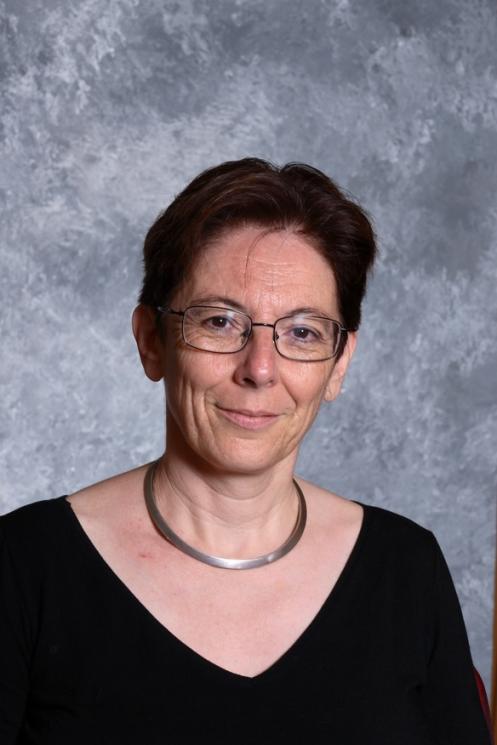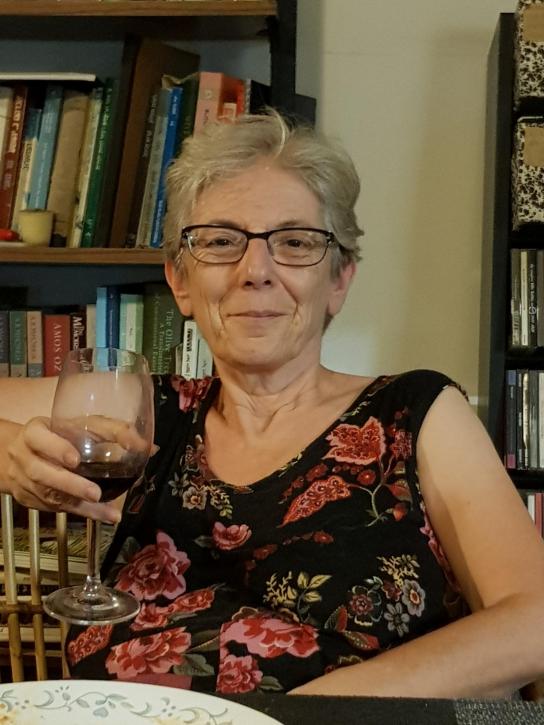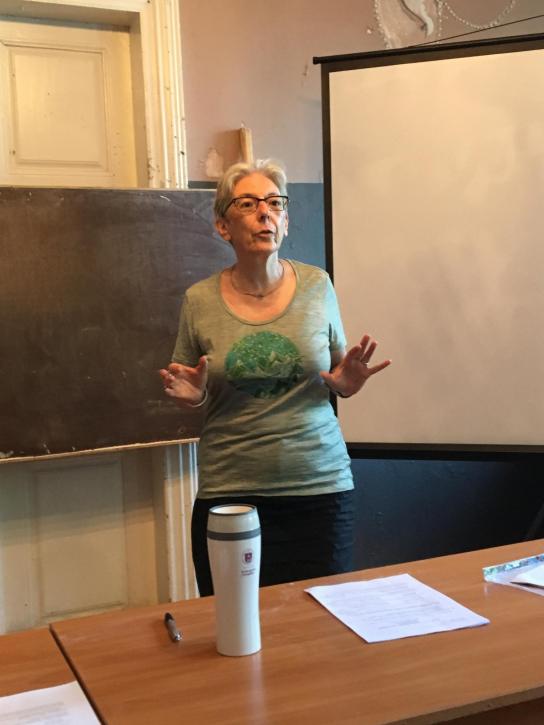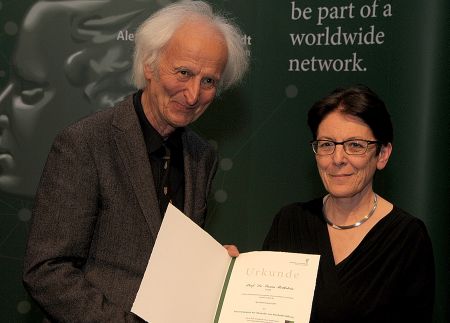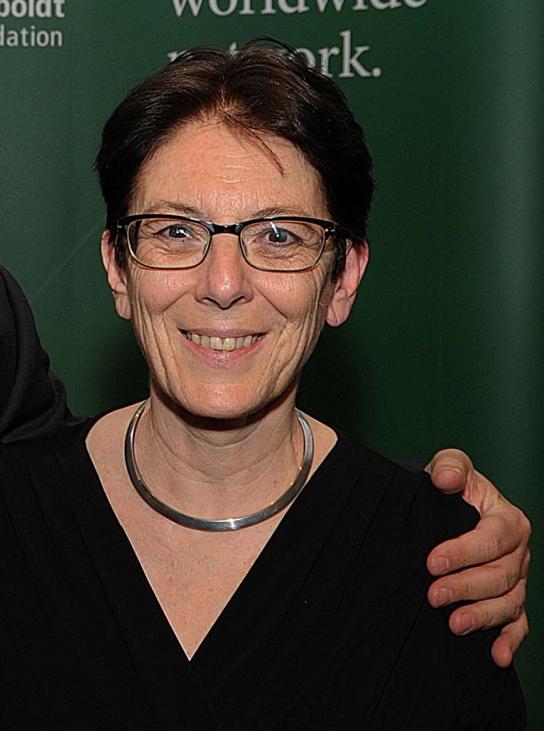Susan Rothstein (1958-2019)
In Memoriam
Susan Rothstein (1958-2019)
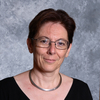
With deep pain and sorrow we mourn the untimely passing of our colleague, mentor and friend Susan Devorah Rothstein ז"ל, Professor of Theoretical Linguistics at Bar-Ilan University, Israel, who passed away on July 30, 2019 in Tel Aviv after a short and sudden illness.
Susan was born on August 20, 1958 in Middlesex Hospital in London and married to Fred Landman in a civil ceremony in Ithaca on 28 July 1994 and in a Jewish ceremony with hupa and kiddushin on 6 October 1994 (Rosh Hodesh Cheshvan).
Susan earned her Bachelor's degree with Honors in 1979 from the School of Philosophy and Modern Languages at Oxford University. She went on to MIT, where she studied Linguistics and Philosophy, completing a dissertation in 1983 on "The Syntactic Forms of Predication" which was published by the Indiana Linguistics Club.
Susan joined the Bar-Ilan University faculty as an Allon Fellow in 1985 following two years as Assistant Professor of Linguistics at the College of William and Mary (US). At Bar-Ilan she was Professor of Theoretical Linguistics and a Fellow in the Gonda (Goldschmied) Multidisciplinary Brain Research Center. She served two terms on the University Promotions and Appointments Committee, twice as Chair of the Department of English Literature and Linguistics, and from 2014-15 was the University Commissioner for the Prevention of Sexual Harassment. She was instrumental in establishing the MA program in Creative Writing in the department and supportive of cross-disciplinary research throughout the university.
Outside of Israel, Susan was a visiting scholar and lecturer in Brazil, the Netherlands (Leiden), the US (Cornell) and France (Université de Paris). She was awarded the prestigious Humboldt Research Award (Humboldt-Forschungspreis) from the Alexander von Humboldt Foundation in 2016 for her work in formal semantics and the syntax-semantics interface. At the awards ceremony she was invited to give one of the four keynote lectures to an audience of top scientists across all disciplines. Her lecture on crosslinguistic aspects of counting and measuring was enthusiastically received.
During her stay at the University of Tübingen, she pursued a number of projects in collaboration and/or "sparring partner competition" with her husband Professor Fred Landman of Tel Aviv University, in particular on the notion of incrementality and maximality in aspectual semantics, and on the notion of "countable portions" in the semantics of mass/count nouns and measure phrases. In their own words: "We were incredibly happy that we could collaborate so easily and be each other's muse for our individual projects."
In the past twenty years or so, Susan shaped the debates on aspect and the mass/count distinction. Her theories were couched in an algebraic (mereological) framework. Her 2004 book entitled Structuring Events - A Study in the Semantics of Lexical Aspect (Blackwell Publishing) has now become a classic textbook in this domain. Her main thesis is that aspectual classes are not generalizations over verb meanings, as commonly assumed since Vendler and Dowty; rather, they constitute a set of constraints on how the grammar allows us to individuate events. Regarding the mass/count distinction, the issues of individuation play a central role for Susan's work in this domain as well. Her findings have appeared regularly in numerous publications, but her most recent thinking on this topic is best reflected in Semantics for Counting and Measuring (2017, Cambridge University Press). While all agree that context is central to grounding the semantics for the mass/count distinction, one of Susan’s key innovations consists in arguing that the ‘counting context’ dependency should be built directly into the lexical meaning of count nouns. She motivates their grammatical count behavior by proposing that their denotation is indexed to counting contexts which determine what is ‘one’ entity in their denotation, as it cannot be a formal atom in their mereologically structured domain or a natural unit associated with a natural kind. The notion of context employed by Susan is one which specifies what is lexically accessible for counting in context. Susan enjoyed a wide recognition for her work on the mass/count distinction, also thanks to its wide cross-linguistic reach (English, Hebrew, Russian, Brazilian Portuguese, Chinese, inter alia). Besides her dissertation, Susan authored three books (Predicates and their Subjects, Kluwer 2001; Structuring Events: A Study in the Semantics of Lexical Aspect, Blackwell 2004; and Semantics for Counting and Measuring, Cambridge 2016); she edited four others, and published dozens of papers in the best journals in linguistics. Her work benefited from collaborations with many colleagues and students. She published many collaborative papers with her students, and in recent years, on different projects with Hana Filip, Fred Landman, Suzi Lima, Adina Moshavi, Roberta Pires de Oliveira and Alessandro Treves.
She believed that better theories of language would come from the interaction between theoretical scholars with a crosslinguistic perspective and a large supply of formal techniques (like herself) and scholars who may be less formal but have deep access to wider ranges of subtle linguistic data. Susan put this conviction at work in many ways, advising and collaborating on work in Chinese, Hungarian, Brazilian languages, as well as Hebrew and English.
She was very proud of her recent work with Professor Suzi Lima from Toronto University, whom she collaborated with on the project "a typological study of the count/mass distinction in Brazilian languages" Together, they designed a questionnaire on the mass/count distinction and counting and measuring that a large number of specialists took on fieldwork trips to the respective languages in the Amazon area they were studying. The results have already been presented at a conference and will be published in a special issue of Linguistic Variation. Susan's most recent paper, which will appear in a volume on the mass/count distinction edited by Jeffry Pelletier, puts some of the fascinating results into a theoretic context. The conclusions that she draws are likely to shape the debate on these issues for some time to come.
Susan has also been engaged, among her many other endeavors, in collaborative research on Biblical Hebrew construct phrases and numerical expressions, combining the formal semantic and the philological approach to language study. She was instrumental in 2017, along with the late Prof. Edit Doron of Hebrew University and Prof. Outi Bat-El of Tel Aviv University, in founding the Biblical Hebrew Linguistics and Philology Network, with the goal of providing a space in which theoretical linguists and biblical philologists can meet to explore mutual research interests. The Network has already held successful workshops in Israel and Canada.
To her students and colleagues, Susan was a true mentor, who was present in good and bad moments, and always had a word of encouragement. She was not just a figure who commanded respect, but also a person of enormous generosity - a rarely found combination. She was an expert in managing pedagogy and administration, but more than anything she provided an ethical compass for the Department of English Literature and Linguistics. She was always ready to help a student or colleague, and when required she fought with tenacity for the causes she knew to be just - however small or large. In addition to her powerful public persona, she acted quietly taking on burdens without ever seeking any recognition. She will also remain a major reference for many women in linguistics. Many of her women colleagues felt she empowered them, and was there to encourage them to move forward in difficult situations.
Susan's generosity extended past family, and even past the Department, to scholars from all over the world. Her home - whether in Tübingen, Tel Aviv or Amsterdam - was open to all, no matter what stage in their career, what nationality, what religion, and she loved sharing meals with all of them.
Susan leaves her husband, Prof. Fred Landman, her daughter Alex, son-in-law Eatai and grandson Ezra, her parents Michael and Vivian Rothstein of Ashkelon, as well as two brothers and many nephews and nieces in the UK.
יהי זכרה ברוך
May Susan's memory be blessed
|
Memories See this page |
|
Pictures
|
|
CV Education
Employment
Honours and Awards
Guest Positions (since 2001)
Additional Invited Teaching
|
|
Selected Publications
a) books as author: Rothstein, Susan, 2017, Semantics for Counting and Measuring Cambridge University Press: Cambridge. Rothstein, Susan, 2004. Structuring Events: A Study in the Semantics of Lexical Aspect. Blackwell: Oxford. Rothstein, Susan, 2001. Predicates and their Subjects. Kluwer: Dordrecht. Rothstein, Susan, 1985. The Syntactic Forms of Predication. Indiana University Linguistics Club: Bloomington, Indiana.
b) books edited: Armon-Lotem, Sharon, Gabi Danon and Susan Rothstein (eds.), 2009. Generative Approaches to Hebrew Linguistics, John Benjamins: Amsterdam. Rothstein, Susan (ed.), 2008. Theoretical and Crosslinguistic Approaches to the Semantics of Aspect John Benjamins:Amsterdam. Rothstein, Susan (ed.), 1998. Events and Grammar. Kluwer: Dordrecht. (with introduction) Rothstein, Susan (ed.), 1991. Perspectives on Phrase Structure: Heads and Licensing. Syntax and Semantics 25. Academic Press: New York.
c) papers: Rothstein, Susan, (to appear) Counting, Measuring and Approximation. In: H. Filip (ed.) Counting and Measuring in Natural Language. Cambridge: Cambridge University Press. Rothstein, Susan, (to appear) Count vs. mass nouns. In: L.Matthewson, C.Meier, H.Rullman, and T.E. Zimmermann (eds.), The Blackwell Companion to Semantics. Malden and Oxford: Wiley/Blackwell: Rothstein, Susan 2013. Adjectivally-headed construct states in Hebrew. Lingua. http://dx.doi.org/10.1016/j.lingua.2013.10.005 Landman, Fred and Susan Rothstein 2012. The felicity of aspectual for-phrases Part I: Homogeneity. Language and Linguistics Compass 6/2 85–96, 10.1002/lnc3.3242011 Landman, Fred and Susan Rothstein 2012. The felicity of aspectual for-phrases Part II: Incremental homogeneity.Language and Linguistics Compass 6/2: 97–112, 10.1002/lnc3.3232011 Pires de Oliveira R, and Susan Rothstein. 2011 Bare nouns in are mass in Brazilian Portuguese. Lingua doi:10.1016/j.lingua.2011.09.004 Rothstein, Susan, 2011. Secondary predication. In P.Portner, C. Maienborn and K.von Heusinger. Semantics: An International Handbook of Natural Language Meaning. Volume 2. Mouten de Gruyter Rothstein, Susan, 2010. Counting and the mass count distinction. Journal of Semantics. 27.3: pp343-397 doi 10.1093/jos/ffq007 Rothstein, Susan, 2009. Measuring and counting in Modern Hebrew. Brill’s Annual of Afroasiatic Languages and Linguistics, Volume 1. 2009. 106-145. Rothstein, Susan, 1999. Fine-grained structure in the eventuality domain: the semantics of predicate adjective phrases and ‘be’. Natural Language Semantics 7, pp 347-420. Rothstein, Susan, 1995. Pleonastics and the interpretation of pronouns. Linguistic Inquiry 26, pp499-529. Rothstein, Susan, 1995. Adverbial quantification over events. Natural Language Semantics 3, pp1-31. Rothstein, Susan, 1995. Small clauses and copular constructions. In A. Cardinaletti & T. Guasti (eds.), Small Clauses, Syntax and Semantics 28. Academic Press: New York (1995) pp27-48. Rothstein, Susan, 1992. Case and NP licensing. Natural Language and Linguistic Theory 10. pp119-139. Rothstein, Susan, 1991. Logical form and grammar: comments on Lappin, May and Reinhart. In A. Kasher (ed.), The Chomskian Turn, Blackwell:Oxford.pp385-395. Rothstein, Susan, 1991. Predication, binding and the c-command relation. Linguistic Inquiry 22, pp572-578. Rothstein, Susan, 1987. The syntactic forms of predication. The Linguistic Review. d) papers in preparation: Rothstein Susan and Roberta Pires de Oliveira Counting and measuring with bare singulars in Brazilian Portuguese. Rothstein, Susan Bare noun phrases and the Universal Grinder Rothstein, Susan Locatives, locations and other entities.
|



